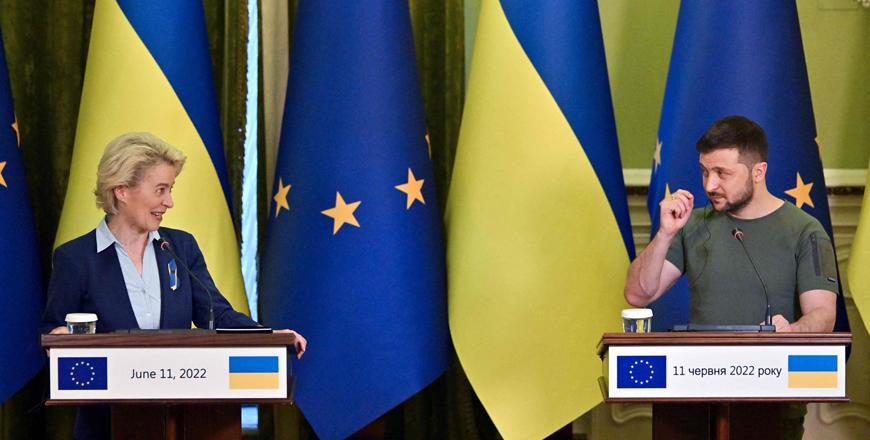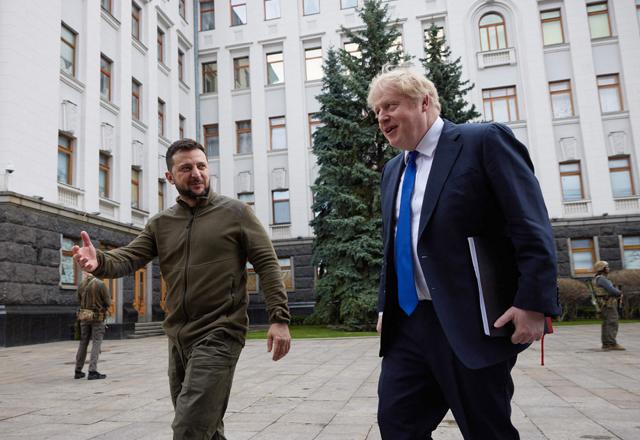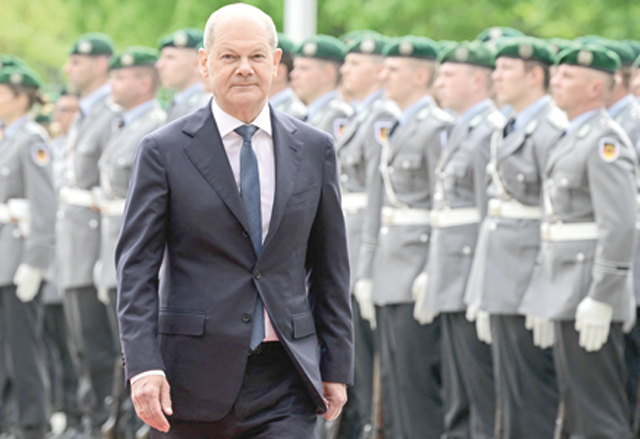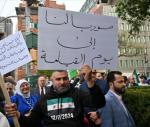You are here
In Kyiv, EU chief says to give signal on Ukraine's hopes next week
By AFP - Jun 11,2022 - Last updated at Jun 11,2022

Ukrainian President Volodymyr Zelensky (right) and European Commission President Ursula von der Leyen make statements following their talks in Kyiv on Saturday (AFP photo)
KYIV — The European Commission will provide a clear signal next week on Ukraine's EU candidate status bid, its chief Ursula von der Leyen said on Saturday, as fighting raged in the east and south of the country.
Making a surprise visit to Kyiv, von der Leyen said talks she held with Ukrainian President Volodymyr Zelensky "will enable us to finalise our assessment by the end of next week" — the first time the bloc has publicly given timing.
Zelensky has been pressing for rapid admission into the European Union as a way of reducing Ukraine's geopolitical vulnerability, which was brutally exposed by Russia's February 24 invasion.
But officials and leaders in the bloc caution that, even with candidacy status, actual EU membership could take years or even decades.
Von der Leyen, appearing alongside Zelensky during her second visit to Kyiv since the war began, did not hold out any promises, noting further reforms were needed.
For his part, the Ukrainian president warned it was a "decisive time" for his country and the EU.
"Russia wants to ruin the European unity, wants to leave Europe divided and wants to leave it weak. The entire Europe is a target for Russia. Ukraine is only the first stage in this aggression, in these plans."
Despite reservations among some member states, EU leaders are expected to approve Ukraine's candidate status at a summit on June 23-24, though with stern conditions attached.
The EU and the United States have strongly backed Ukraine, sending weapons and cash to help it see off Russian forces, and punishing Moscow with unprecedented economic sanctions.
Zelensky has urged them on during a continuous diplomatic offensive that has seen him appearing via video link at parliaments and summits around the world.
On Saturday, he warned the Shangri-La Dialogue security summit in Singapore of the dangers of a global food crisis posed by Russia’s blockade of Ukraine’s Black Sea ports.
He warned of “an acute and severe food crisis and famine”, adding that the “shortage of foodstuffs will inexorably lead to political chaos” — all of it “the direct consequence of the acts of the Russian state”.
Before the war, Ukraine was the world’s top producer of sunflower oil and a major wheat exporter, but millions of tonnes of grain exports remain trapped due to the blockade.
Speaking to delegates including Pentagon chief Lloyd Austin and China’s defence minister, Zelensky urged international pressure to end the blockade.
Kyiv is in discussion with the UN, Turkey and other countries to open a way to allow the grain exports, and Zelensky said the talks are focused on the “format” of the corridor.
‘Devastate every city’
After withdrawing from the capital Kyiv, Russian forces have concentrated their firepower on the eastern Donbas region and the south.
They continued their bombardment overnight Friday-Saturday of towns and villages around Kharkiv and in the Donbas regions of Lugansk and Donetsk, Zelensky’s office said.
“Russia wants to devastate every city in the Donbas, every single one, without exaggeration,” the president said in his nightly address on Friday.
Moscow has particularly focused on the key eastern industrial city of Severodonetsk, which Lugansk regional governor Sergiy Gaiday said on Saturday was “ruined” by Russian forces.
“This is their tactics — people are not needed, the infrastructure is not needed, houses are not needed, everything should be simply ruined,” he said in an interview posted on his Telegram channel.
He declined to estimate the number of civilian victims, but said he expected the figure would be “enormous and terrible”.
“Many people were buried in front of their houses’ entrances. A shell from heavy artillery is tearing people up into bits and pieces,” he said.
He added: “They lie like this for a day, three or four. It is impossible to take them out because there is constant shelling.”
In the Mykolaiv region near the front line in the south, regional governor Vitaliy Kim stressed the urgent need for international military assistance.
“Russia’s army is more powerful, they have a lot of artillery and ammo. For now, this is a war of artillery... and we are out of ammo,” he said.
British Defence Secretary Ben Wallace visited Ukraine on Friday, where Zelensky thanked London for its support.
Following Washington’s lead, Britain announced the delivery of multiple rocket launcher systems — with a range of about 80 kilometres, slightly superior than the Russian systems.
It was not clear when Ukraine will be able to start using them.
Russian passports issued
In areas now controlled by its forces, Moscow has sought to impose its authority.
Authorities in the occupied city of Kherson in southern Ukraine handed out Russian passports to local residents for the first time on Saturday, news agencies reported.
Russia’s TASS agency said 23 Kherson residents received a Russian passport at a ceremony through a “simplified procedure” facilitated by a decree signed by Russian President Vladimir Putin in May.
Ukraine has denounced the move as a “flagrant violation” of its territorial integrity, saying Putin’s decree was “legally void”.
It follows the introduction last month in the Kherson region of the Russian ruble as an official currency alongside the Ukrainian hryvnia.
Related Articles
KYIV — Russian forces have seized control of half of eastern Ukraine's key city of Severodonetsk, a senior official said Tuesday, hours afte
KYIV, Ukraine — British Prime Minister Boris Johnson paid an unannounced visit to Kyiv on Saturday in a "show of solidarity" with Ukraine a
BERLIN — Germany will support Ukraine as long as needed, Chancellor Olaf Scholz said Sunday as President Volodymyr Zelensky visited Berlin f


















